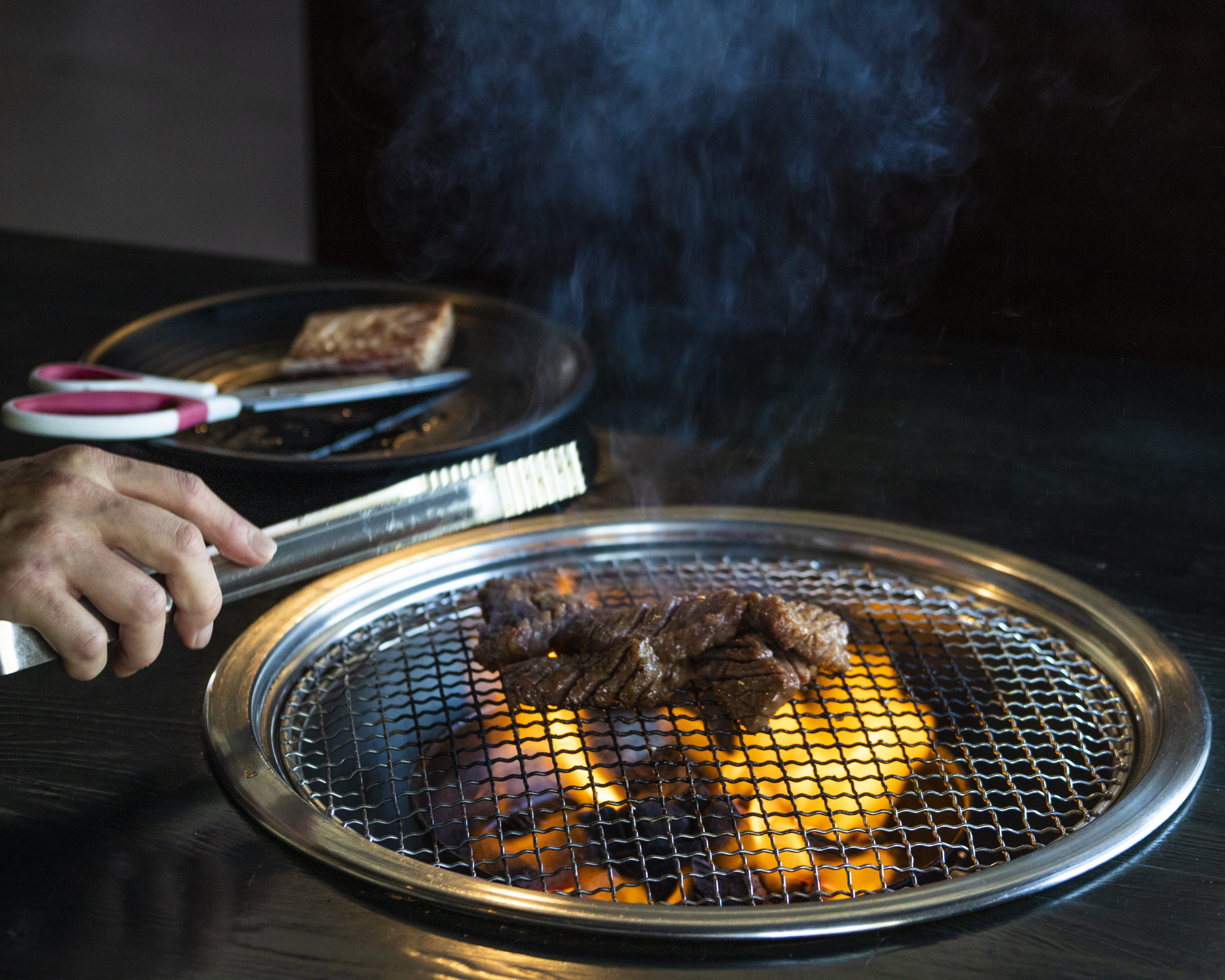On May 27, the Los Angeles City Council passed a motion that would ban natural gas in new commercial and residential buildings. While no set plan is in motion as of yet, the intent is clear—Los Angeles is to move away from using natural gas.
The ramifications are innumerable, but one of the biggest industries that will be impacted by this new law is Korean barbecue restaurants, where a gas-flamed barbecue at your table is essential to the food and experience.
In the wake of the announcement, many Asian restaurants voiced their concerns in an LA Times article. Leo Lee, co-owner of RiceBox, expressed disdain for the motion to the LA Times. “The wok itself is really essential to Asian cuisine,” Leo said. “By taking gas away, you’re telling us we cannot use woks anymore.”
Since then, Hey SoCal got in contact with the office of Councilmember Nithya Raman, the person who proposed the motion. When asked if the ordinance would have exceptions for certain restaurants (such as Korean barbecue restaurants), they contended that Korean barbecue restaurants in particular use propane for their cooking.
“This ordinance also only affects new construction, so no existing restaurant will be affected…To specifically address your question on Korean barbeque, to our knowledge, the main fuel source used is propane.” Jenith Shon, manager at Arcadia-based Korean barbeque restaurant SBD Flame didn’t agree with the contention.
Hey SoCal reached out to Shon to discuss the motion and its implications for the future of cuisine in Los Angeles. Shon has heard of the proposed changes and had many opinions about what this means for restaurants and cuisine in the future.
Burning uncertainty
Hey SoCal: How do you feel about the motion recently introduced to phase out gas from future residential and commercial buildings beginning in January 2023?
Shon: They’re doing this one for global warming, right? I think they got the point but their movement is not that correct, because there’s something much more that they can fix before tabletop stoves. As I know, an ordinary American family mainly eats meat-based meals. And meat consumption is growing. And for that, they have to make it a factory system. To keep that system, they have to get the land for that they have to cut up the woods and get their land.
Because they’re cutting out the woods, the trees and forests cannot produce oxygen anymore, they cannot take the CO2 (carbon dioxide) anymore. The circulation of air is not going nicely. So if they spend that much money on this political movement, I would say they should probably try to change the American diet.
Hey SoCal: We got a quote from Nithya Raman’s office, the person who was in charge of passing the motion. They mentioned that Korean barbecue restaurants use propane instead of natural gas.
Shon: I don’t want to speak for others. But for this restaurant, we use charcoal. Korean barbecue is best with charcoal. The thing is that in California, most of the buildings, because of earthquakes, will be wood base buildings. Fire inspection is really sensitive, so if you only use charcoal, we have to get an extra inspection and extra insurance for that.
That’s why we use gas, though. Personally, I don’t like gas stoves. It leaves some kind of really artificial gas smell on the surface of the meat. To enjoy this barbecue, we have to use charcoal. In reality, like I just mentioned, it’s really hard to get charcoal all the time. That’s why we put a gas stove on the table. Without it, what’s the point? What’s the point of Korean barbecue?.
I understand their movement, but the thing is to get the substitute for them already. Then the business can survive and the cultures can feel comfortable, not feeling offended about those government actions.
That should have come first before they announced this. Because right after they announced it, honestly, every day, all the workers, all the people that I know from the industry, we just talked about that.
Before it was just like, ‘Oh, it’s so hard to run the business.’ What should we do? The economy’s going down. It’s getting worse and worse, but we have to survive. Right now, you just talked about the gas stoves and that much will affect every person. Every business. How can we survive without this? Right? How can we survive?
Hey SoCal: How do you feel Korean barbeque is representative of your culture?
Shon: In Korean culture, we just use one big table inside a room and share the pot together. We put our spoons in the pot and share. Yeah, it’s not that clean, but you’re sharing the experience together.
We learn how to respect all those foods and where they come from. We learn that and talk to each other. Western culture has that too, one big table where they talk a lot. Sharing the food is a little different.
Korean barbeque is one of the easiest ways to get around the table and actually share the food.
Hey SoCal: Can you explain how gas is integral to this form of cooking?
Shon: Korean barbecue is so unlike other barbecues—we have to cook on the table. You cook it by yourself. Well, a lot of people don’t know about that yet. We cook it. That’s the fun of it. Every family in Korea knows how to cook in their own way, so we share the cooking, we share the food, and that is our culture.
Everybody likes having cooking on the table because it’s really fresh. It’s really clear what kind of meat you have. The cooking process is much cleaner than others. We also have dishes that we cook inside of the kitchen, but the customer doesn’t know what happens during the process.
Cooking on the table is so clear. You see the ingredients, and you cook it or they cook it on the table. What can be more clear than that? That’s the fun.
Hey SoCal: What would you say is the difference between gas and electricity?
Shon: The highest heating point is so different. If you use electric stoves, you don’t have that direct contact with a flame and the meat. It’s not going to burn the space enough to make the meat crispy. It’s going to be all rubbery or really tough if we grill like that.
If you use an electric stove on the table, it’s not going to reach that point. And even if it does, it’s going to consume a lot of energy to reach that level. I think it’s gonna be, I don’t know, double the cost of energy consumption.
How many people have to work to create that energy out there? I know it is much more complex than the example I just told you about. Still, as a consumer choosing between gas and electricity, I choose gas for now.
Hey SoCal: Would you say that electric grills are going to have to be proven before people get on board with them?
Shon: That is certainly true. For family use, a lot of electric grills and pans are used. You can easily get them from Amazon or a Korean market. It’s really common. But business use, it’s a little different.
Why do you go to restaurants? Maybe you don’t want to cook at home or maybe you want to have something different. The thing is, they can do it at home. There has to be a certain difference between home-based food and restaurant-based food. If we’re selling the same food that everybody can make easily, what’s the point?
Just think about it. If the customer comes here and the meat is not any different from grilling at home, what’s the point of being here? They won’t come. I wouldn’t come. They come here to have something different. Something better, something more special, something more professional. If Korean barbecue isn’t special anymore, the old restaurants have to shut down.
Hey SoCal: Do you feel like this motion might eventually lead to change for current restaurants, even though they said it would only apply to future residential and commercial buildings?
Shon: Of course. In the beginning, there would be no new restaurants, so customers would come here. But then, there wouldn’t be enough competition. The market would just be stuck. Because of the regulation, new restaurants can’t do anything—no spending, no marketing, nothing. It’s the same thing over and over. Of course, that process is gonna make us disappear.
If we don’t evolve the system, just cutting off the system, how many people can survive? Some people who run the restaurants aren’t not educated, they just chose that business because they just know how to cook. They don’t know how to evolve the technology, they don’t know how to handle that equipment. If this regulation exists just like that, all those regular people who don’t have enough professional knowledge are going to disappear.
Hey SoCal: Do you feel like people are going to push back some more against this?
Shon: Yes, we have to. Korean barbeque is just the beginning. It’s gonna spread out to all kinds of different cultures. Maybe a Mexican restaurant next door, or a donut shop, or an Italian restaurant. It’s far-reaching. It’s not going to be a big, broad step. One by one, they’ll have to close down the business or change.
Hey SoCal: But if they were to, in the future, mandate gas removal from current businesses, would you change to an electric grill?
Well, I would voice up, but I’m not going to go against the government. I really do respect them. If they went to enough consideration and still have the same result, I’m going to follow them because I do respect the government’s job. I just hope they’re very clear about why they’re making that regulation, and how they’re going to do that. Hopefully without any violence or aggressive expressions.
You have to talk to each other. There are so many dramatic changes right now—not only in food. If we understand each other a little more, it’d be better.
You can reach Eloin Barahona-Garcia at eloin@beaconmedianews.com.







